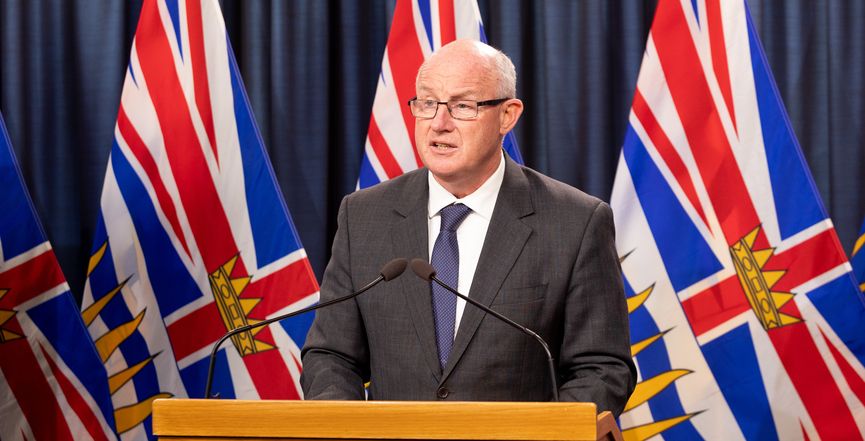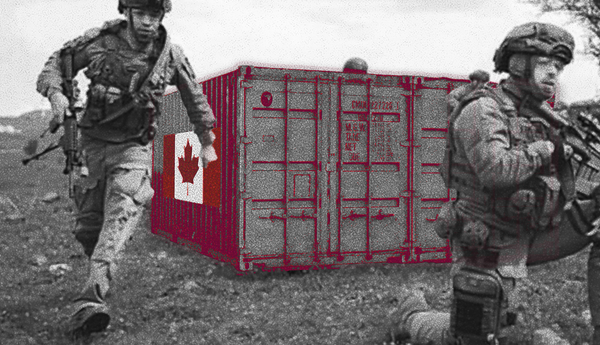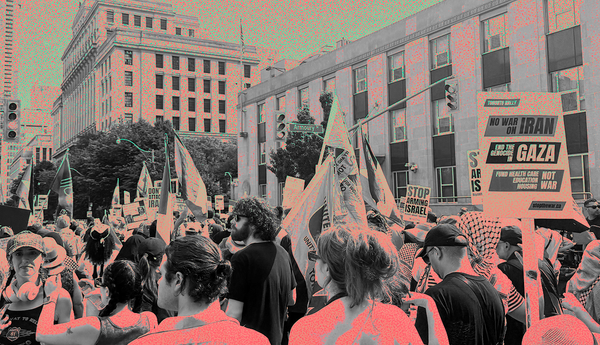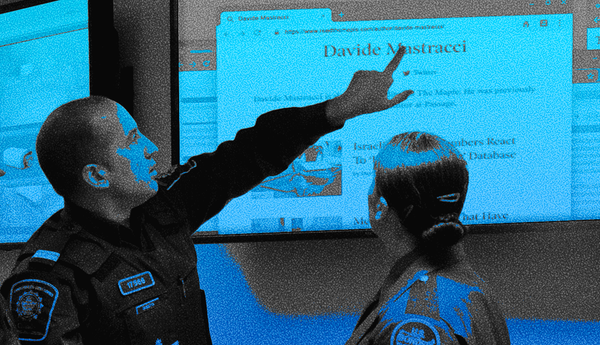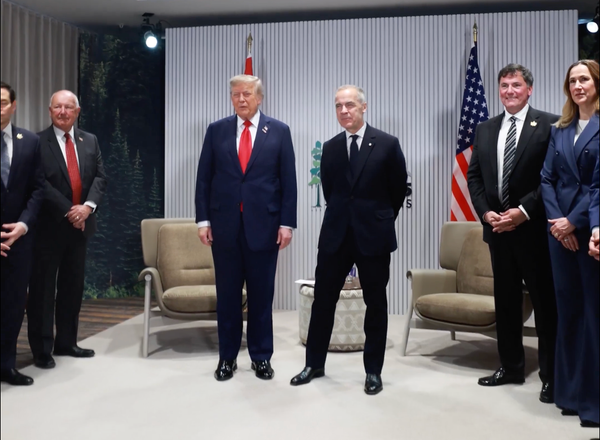A legal expert, a press freedom advocate and a Wet'suwet'en land defender are questioning B.C. Public Safety Minister and Solicitor General Mike Farnworth's claim he cannot weigh in on the arrests that took place on Wet’suwet’en territory last week.
On Nov. 19, heavily armed RCMP officers arrested Indigenous land defenders and two journalists, Amber Bracken and Michael Toledano, on Wet’suwet’en land, where hereditary chiefs and their allies oppose the construction of the Coastal GasLink pipeline. A subsequent video showed that Bracken and Toledano, who were both on assignment, identified themselves as journalists to the officers during the arrests.
While band councils along the pipeline route have signed agreements with Coastal GasLink, a landmark Supreme Court of Canada case in 1997 found the hereditary leadership of the Wet’suwet’en and Gitxsan Nations are the rightful title holders of the land in question.
The arrests of the journalists prompted strong pushback from media outlets (including The Maple) and press freedom organizations. Most of those arrested, including Bracken and Toledano, were released earlier this week after agreeing to abide by the terms of an injunction intended to keep land defenders away from the pipeline work sites.
Observers, including Toledano, have criticized the heavy attention given to the arrests of the journalists rather than the land defenders. On Tuesday, Toledano tweeted: “The news spotlight on the arrests of myself and (Bracken) is telling.”
“There's a narrative shift from the violent arrests of Wet'suwet'en ppl to the RCMP's anti democratic conduct,” Toledano continued. “But for Wet’suwet’en land defenders, Canada is an authoritarian imposition, not a democracy.”
Asked about the arrests by B.C. Green Party Leader Sonia Furstenau in the legislature on Monday, Minister Farnworth said:
“When it came to the issue of the journalists, that went in the appropriate place in terms of the court, which issued a decision around bail and the undertaking, which the journalists agreed to do, and they were subsequently released. In other words, the judicial process worked appropriately, and that's as it should be. Not being directed by politicians.”
Asked to clarify whether he felt the arrests of journalists on Wet’suwet’en territory were "appropriate," Farnworth told The Maple in an emailed statement sent Tuesday:
“A free press is critical to our society and our democratic process. Police operate at arms length from government and the Solicitor General does not direct police operations. As this matter is before the courts we will not be making any further comment.”
David Milward, a law professor at the University of Victoria and member of the Beardy's and Okemasis First Nation, told The Maple that Farnworth’s insistence he does not direct police operations is only true in certain circumstances.
“There can be some executive decisions, because some executive authority associated with (the solicitor general and attorney general) means that they can make decisions about law enforcement,” said Milward.
“If it was just a case of police doing the everyday thing on the beat, making arrests and so on, that didn't step in any policy direction provided by the Solicitor General, then absolutely (Farnworth's) comments would be appropriate,” he continued.
However, Milward noted that the B.C. Civil Liberties Association published a letter sent by Farnworth to the RCMP’s “E” Division in January 2020 which authorized the temporary redeployment of police resources to "maintain law and order” in the construction area of the Coastal GasLink pipeline.
“If he actually did write that letter to the RCMP commander, then I think it is actually fair game for him to actually answer questions with respect to that earlier decision,” said Milward. “If there actually was direction last year about a redeployment of the RCMP provided by Solicitor General Farnworth, with that I think it's entirely appropriate that Farnworth should field questions with respect to these matters.”
But even if such a directive was not issued, said Milward, it would still be appropriate for Farnworth to speak up publicly if he believed the police's conduct was inappropriate or unlawful.
Jim Turk, director of the Centre for Free Expression at X University, told The Maple he found Farnworth’s comments disappointing.
“For the police to arrest journalists in this case (was) an unacceptable violation of freedom of the press in Canada,” said Turk. “Although (Farnworth) could rightly say that the government doesn't direct the police, he certainly could have taken the occasion to say that the government is strongly committed to freedom of the press, and is concerned about what happened in this case.”
Turk said directing police operations and commenting on police conduct are two different things.
“As the Public Safety Minister, I can imagine he's concerned not to appear to be directing police or chiding them in public,” said Turk. “On the other hand, there is no excuse for him not to indicate that the government upholds a robust protection and respect for freedom of the press, and that instances like this are of concern.”
Turk said the RCMP’s recent arrests of journalists follow a long history of the police force acting with impunity in regards to press freedom.
“Freedom of the press (is) one of the four fundamental freedoms recognized by the Charter, and when it's intruded upon, the default position should be in support of the journalists, not in support of the police,” he added.
In a recent Twitter thread, journalist Desmond Cole noted that freedom of assembly is also one of the Charter's four fundamental freedoms, and argued that attention should not be given exclusively to the arrests of journalists.
“Do journalists who breach an injunction have more right to be free from arrest than the people defending the land?,” wrote Cole.
In an interview with The Maple on Friday, Sleydo', one of the land defenders who was arrested during the RCMP raid and released earlier this week, said the police unit enforcing the Coastal GasLink injunction is the Community-Industry Response Group (C-IRG).
"It's absolutely worrisome and dangerous for the government not to be having oversight into Indigenous issues over land, and that there's particularly this rogue group of RCMP that are implementing and interpreting the law in whatever ways they see fit with no accountability whatsoever," said Sleydo'.
The video footage of the RCMP raid shows an officer pointing a gun in Sleydo's direction as officers broke down the door of the tiny house where the land defenders were located using an axe and a chainsaw.
The RCMP did not respond to questions sent by The Maple on Wednesday asking why an officer pointed a weapon at the land defenders.
"It was absolutely excessive force, and this is the kind of treatment that we've been receiving as Wet'suwet'en Indigenous people," said Sleydo'. "This would never have gotten to this point if the government was doing their job and upholding their responsibility to Indigenous people. It is absolutely the fault of the Province and Canada that this issue has not been addressed."
Sleydo' said the lack of response from the federal and provincial governments about the arrests speaks to a lack of political will.
Under the terms of her release established earlier this week, Sleydo' said she can only access her territory to engage in cultural, hunting or trapping activities. Like other land defenders who were released, she must stay 75 metres away from Coastal GasLink work sites and equipment.
"That restricts me from moving throughout my territory, which is a constitutionally protected right," said Sleydo'. "We're trying to take care of one another, trying to find places for people to be, and for us to do the healing work that has to be done."
She added that the land defenders plan to file legal challenges over the arrests.
Editor's note, Nov. 26, 2021. 2:17 p.m., PST: This story has been updated to include comments from Sleydo' following an interview with The Maple that took place after the story was originally published.
Alex Cosh is the managing editor of The Maple.


